The pipeline fight has definitely been an uphill battle but over the past two years, I've realized this is the most important work we could be doing. We hardly ever have the opportunity to truly build relationships with people who don't already agree with us. And this campaign has allowed thousands of Iowans to look past party divides and focus on our commonalities - our love for the land, our families, and our communities.
Recently the North Dakota Public Service Commission denied Summit's CO2 pipeline! From what we can tell - this is the first time North Dakota has ever denied a pipeline. Historic stuff is happening because we're working on something that impacts us all and not focusing on stuff meant to divide us.
When we build big coalitions, we can beat big money and challenge people's loyalties. This work is changing what is politically possible in the future in Iowa.
Take care,
Jessica Mazour, Conservation Program Coordinator for the Iowa Chapter of the Sierra Club
What you can do to help the environment
-
Write to Department of Natural Resources about Supreme Beef's flawed nutrient management plan
-
RSVP to attend the annual meeting, Celebrating 50 Years of the Endangered Species Act, September 16, 10:30 to 3:00, Grinnell, Iowa
-
Donate to the Iowa Chapter of the Sierra Club so that we can continue our work on the carbon dioxide pipelines and Supreme Beef.
In this issue of the Iowa Sierran
Pipelines
-
Victory! North Dakota Denied Summit!
Protecting the Environment
-
SUPREME BEEF submits flawed nutrient management plan
-
RSVP: September 16. 10:30 to 3pm, Annual meeting - Celebrating 50 Years of the Endangered Species Act - Grinnell
-
Climate change increases air turbulence – flights becoming bumpier
-
Get to know your candidates for school board
Plus
-
Join us for interesting and informative Lunch and Learns
-
Contribute to the Iowa Chapter
-
Volunteer for the Iowa Chapter
-
Calendar of events
-
To see the archive of previous Iowa Chapter newsletters
-
To see the White Pine Needle newsletter
SUPREME BEEF submits flawed nutrient management plan
Supreme Beef recently submitted a revised nutrient management plan. Like the last one, this one is also flawed.
The Iowa Department of Natural Resources is gathering public comment on Supreme Beef's newest nutrient management plan. You may submit written comments to Kelli.Book@dnr.iowa.gov .
Problems with the latest nutrient management plan
Sierra Club has identified a number of problems with the recent version of the nutrient management plan, including
- The effluent basin cannot be sited in karst terrain. Supreme Beef claims they are separating the solids in the animal waste from the liquid. If they are, then the earthen storage basin is a settled open feedlot effluent basin. Legally, a settled open feedlot effluent basin cannot be operated in karst terrain. Supreme Beef was built in karst terrain.
- Although the new nutrient management plan claims the solids and liquids in the manure are being separated, it appears that Supreme Beef has abandoned the separation process. If they indeed have abandoned the separation process, the nutrient management plan cannot claim they are separating the solids and liquids.
- The numbers used for the concentration of nutrients in the manure are incorrect. The new plan claims the numbers come from a table provided by the Department of Natural Resources. However, the numbers are not in the table.
- The current plan identifies 26 fields to apply the solid and liquid manure while the previous plan identified 45 fields. It is a concern that there may not be enough land to apply the manure solids and liquids.
- The plan does not identify if solids or liquids are being applied to the fields. The concentration of nutrients varies between liquids and solids. That will affect the application rates, so that the manure can be applied in an amount that will not run off the fields.
- There is no accounting for ephemeral gully erosion from the fields.
Sierra Club hopes that DNR will require Supreme Beef to rectify the problems with the nutrient management plan or to remove the cattle from the confinement.
Background
Supreme Beef LLC is beef cattle feeding operation in Clayton County, housing 11,600 animals. It operates as an open feedlot because the animals are housed in an unroofed or partially roofed area. DNR regulations say that if the animals are housed in a building that is at least 10% unroofed, it is an open feedlot. In the case of Supreme Beef, the 10% unroofed portion is the feed bunk. So the animals stick their heads out of the buildings to eat. The cattle never leave the buildings to go outdoors.
Supreme Beef sits near the headwaters of Bloody Run Creek, one of the most treasured trout streams in Iowa. It is also designated as an Outstanding Iowa Water.
Sierra Club sued the DNR and Supreme Beef about their last nutrient management plan. Sierra Club won the lawsuit when a Polk County District Court judge ruled that the Iowa Department of Natural Resources (DNR) improperly approved the previous version of Supreme Beef’s nutrient management plan. The nutrient management plan is a document that lays out the amount of manure that can be applied to crop fields and identifies those fields, so that the manure can be used by the crops and will not run off the fields into water bodies.
DNR told Supreme Beef that they must submit a new plan. Until that plan has been approved, Supreme Beef is not authorized to empty any of its manure storage structures.
The revised plan is now under consideration by the DNR.
Below is an aerial view of the Supreme Beef confinement operation.
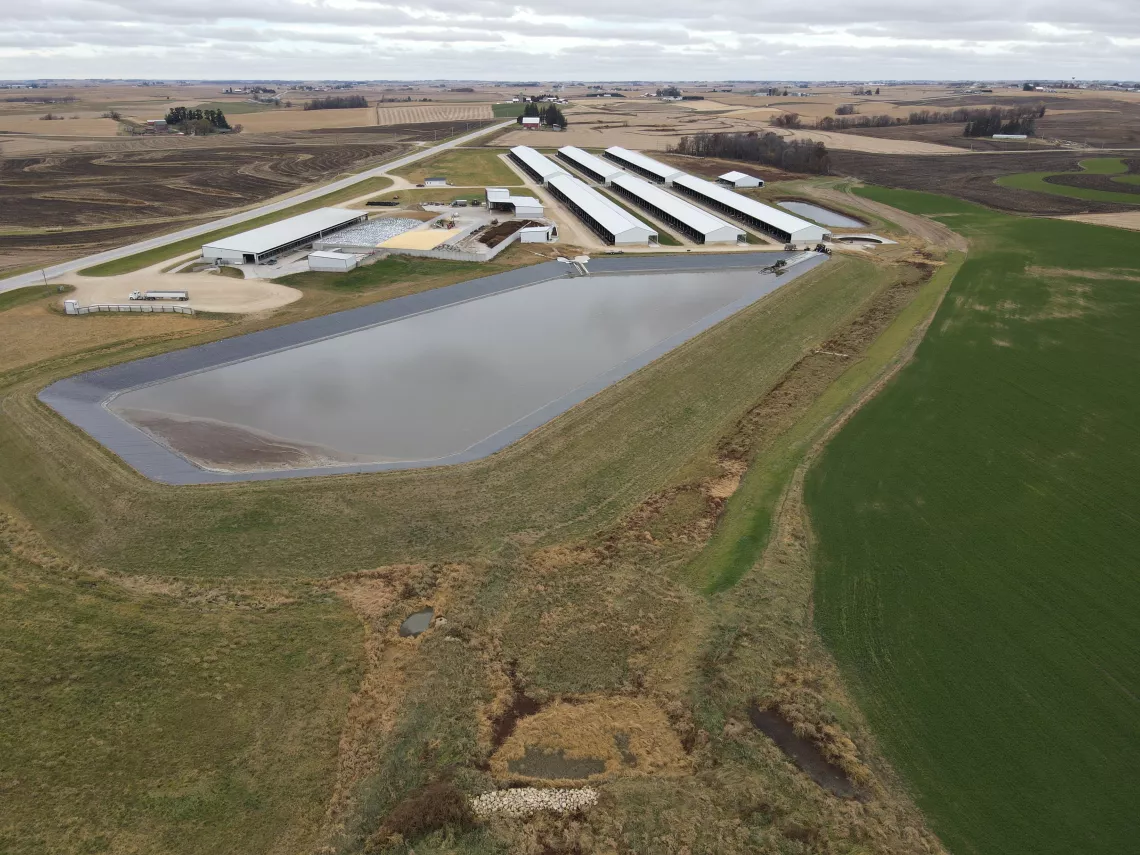
September 16, Annual meeting - Grinnell, Iowa
Celebrating 50 Years of the Endangered Species Act
The annual meeting will be at the Humanities and Social Studies Center Multi-purpose Room at Grinnell College, 1226 Park St, in Grinnell, Iowa. Doors will open at 10:30 am on September 16. Cost is $30 per person - pay at the door. We will have speakers plus a really great lunch. RSVP by Sept. 6
(The best place to park will be the small lot across from the Humanities and Social Studies Center or street parking.)
Agenda
10:30 – registration, meet and greet
11:00 – Neil Hamilton, discussing his new book The River Knows. Neil is the former director of Drake University Agriculture Law Center. He is now a professor emeritus at Drake.
12:00 – lunch
1:00 – Dr. Dan Flores, discussing his book Wild New World: The Epic Story of Animals and People in America. Dr. Flores served as the A.B. Hammond Chair in Western History at the University of Montana. He is working with Ken Burns on a documentary on the bison. Later this year, Time magazine will be publishing his article about the 50th anniversary of the Endangered Species Act. Dr. Flores will be appearing via Zoom.
2:30 – What’s next?
We hope to see you on September 16! RSVP by Sept. 6
Don’t miss this informative and exciting event!
Book Review of Wild New World
By Dr. David Hoferer, Iowa Chapter Excom Member and Professor of Biology and Environmental Science at Briar Cliff University
Dan Flores, in Wild New World, has written a “big history” of North America. Throughout the past several thousand years, and especially over the last 500 years, Flores traces how the attitudes, movements, and behaviors of human groups have shaped the landscapes and wildlife of the continent. Why did the large mammals like mammoths, mastodons, and dire wolves go extinct? Largely due to overhunting. How did the European colonists view this new world? As an Eden, largely untouched by human hands, which could be shaped by them according to their interests. But, of course, the colonists were wrong. The landscapes and wildlife of North America had been influenced by Native Americans for thousands of years. All of these forces came together to make the continent what it is today. The big history of how we have treated the wildlife of North America is not pleasant. But it is a story that everyone living here needs to know. Dan Flores has pulled together information from diverse fields of study in order to provide us with this big history.
Victory! North Dakota Denied Summit!
On Friday, August 4, the 3-member North Dakota Public Service Commission (PSC) unanimously voted to deny the Summit pipeline. This is a historic decision because we cannot find another case where North Dakota has denied a pipeline. Organized people can beat big money!
The PSC said Summit “failed to meet its burden of proof to show the location, construction, operation, and maintenance of the Project will produce minimal adverse effects on the environment and upon the welfare of the citizens of North Dakota.”
Summit did not sufficiently explore an alternate route south of Bismarck instead of east and north of the city, did not adequately explore route alternatives for some landowners along the route, and Summit did not adequately mitigate impacts of some waterfowl protection areas along the route.
Summit has announced that they will reapply in North Dakota but they have to start the whole process over again. Until then, Summit is a pipeline to nowhere because they have no way to get to their sequestration area.
We have been fighting the same fight in Iowa as North Dakota. If Summit failed to meet the burden of proof there, they have failed to meet it here as well.
We are calling on the Iowa Utilities Board to delay Summit’s hearing. There is no point in wasting time, money, and capacity on a pipeline to nowhere.
Unless the IUB delays the hearing, it is scheduled to begin on August 22, at 10 am in Fort Dodge. Please join us at 9am for a press conference. We need to pack the room to show IUB that we are taking this seriously and we expect them to as well.
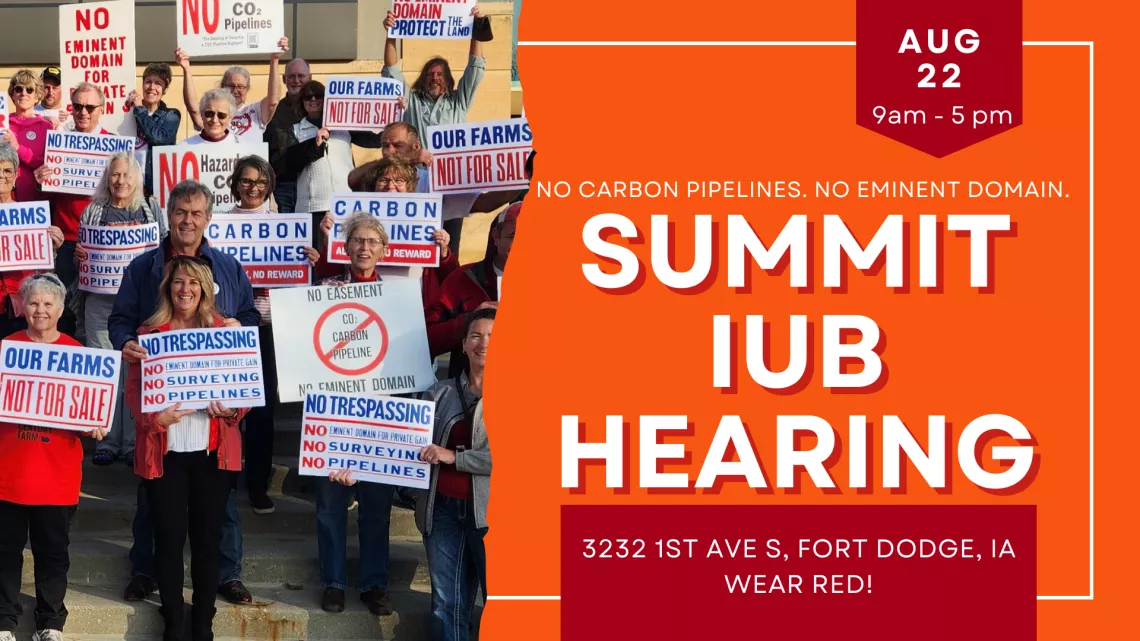
This big victory in North Dakota shows us that when we work together and organize everyday people, we can build enough power to beat big money.
The first domino just fell and we still have nearly 1000 unsigned easements on Summit’s route in Iowa. We need to keep up the fight to make sure we stop Summit for good!
Ethanol industry didn't invent CO2 pipelines
We have had a few questions about how the carbon dioxide pipelines came to be and how the ethanol industry decided to employ them for carbon capture.
CO2 pipelines have been around for decades, mostly for a process called Enhanced Oil Recovery. The recent push for a massive expansion of CO2 pipelines is due to the 45Q federal tax credit that allows companies to be paid per ton for carbon sequestration or Enhanced Oil Recovery.
There is big money on the table for companies to find CO2 sources and pipe the CO2 to places like Illinois or North Dakota. Companies like Summit, Navigator, and Wolf are the first to jump on the bandwagon and go after the low-hanging-fruit of CO2 - the ethanol plants. Unlike coal-fired power plants, fertilizer plants or other industries, the emission stream from the fermentation process used by the ethanol plants is nearly pure CO2, meaning the process to separate out the CO2 is cheaper and much less burdensome. This makes CO2 from ethanol plants the cheapest and most profitable CO2 source.
If these projects are approved, we expect to see other types of facilities sign on with the projects.
The tax credits created a market for CO2. Wealthy investors created companies to take advantage of the tax credits and ethanol plants are the first industry to be courted by the CO2 pipeline companies.
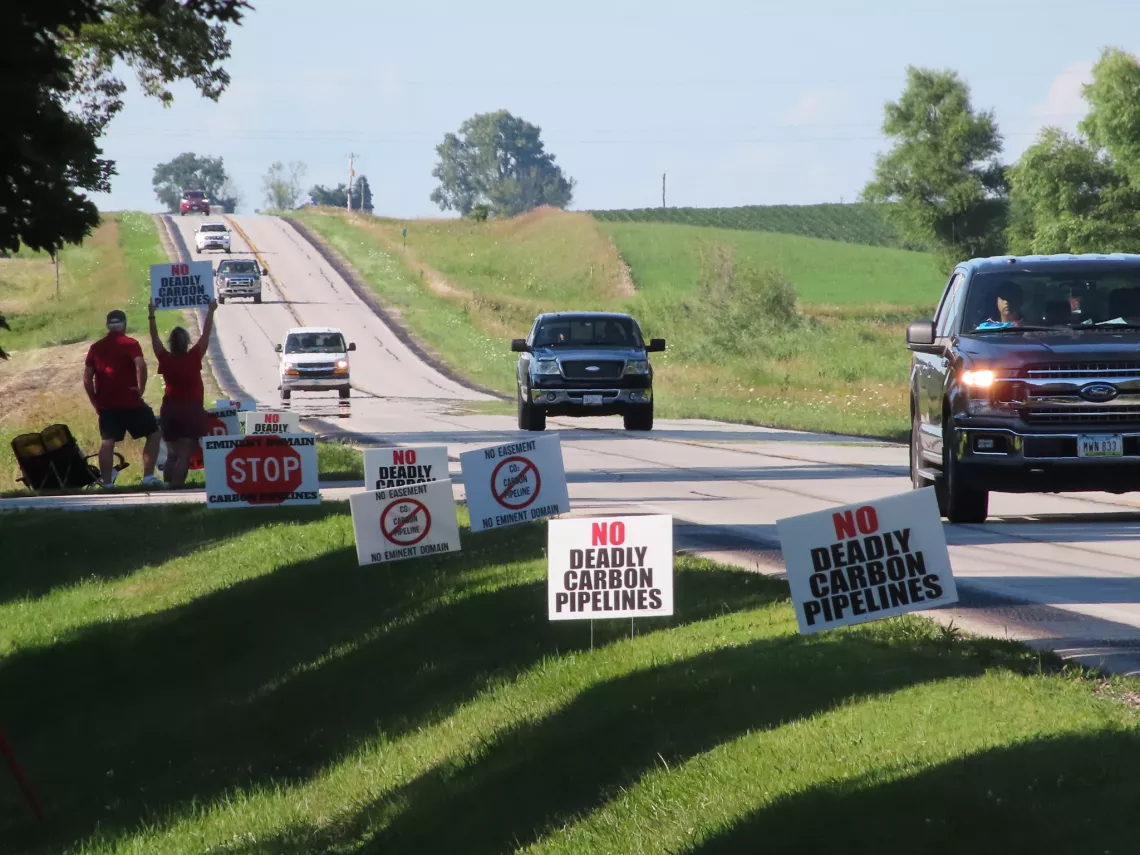
Climate change increases air turbulence – flights becoming bumpier
Researchers have confirmed that airplane flights have become bumpier in the last 40 years. Climate change is the reason for the increased turbulence. The researchers looked at data from 1979 to 2020.
The jet stream is a system of air currents a few miles above the earth’s surface. Warmer air creates stronger differences in the jet stream. That creates wind shear – a sudden change in speed or direction of the wind - and the increased turbulence. Climate change is causing warmer air.
Severe clear-air turbulence has increased by 55%, from 17.7 hours to 27.4 hours annually. Moderate turbulence has increased by 37%, from 70 hours to 96.1 hours annually. Light turbulence increased 17% to 546.8 hours in 2020. The greatest increases are along flight routes in the United States and North Atlantic. The routes in Europe, the Middle East, and the South Atlantic also experienced significant increases in turbulence.
This is a concern, in that turbulence puts flight crews and passengers at risk of injury, increases the wear and tear on aircraft, and can cause delays in flight schedules. Further, wind shear is difficult to detect and forecast since it happens in clear air above the clouds and is not associated with storms. When pilots detect wind shear and turbulence, they either slow the planes speed or move to a higher altitude.
Obviously, the release of greenhouse gases in the atmosphere needs to be significantly reduced.
If you are flying, it is wise to keep your seat belt fastened during the flight.
Sources
Mark C. Prosser, Paul D. Williams, Graeme J. Marlton, R. Giles Harrison, “Evidence for Large Increases in Clean-Air Turbulence Over the Past Four Decades”, Geophysical Research Letters, April 20, 2023
Ayesha Rascoe, Scott Newman, “Bumpy airplane ride? Blame climate change”, NPR, April 9, 2023
Matthew Taylor, “Climate crisis leading to more turbulence during flights, says study”, The Guardian, June 8, 2023
“Why flights are bumpier”, The Week, June 20, 2023, page 19
Get to know your candidates for school board
This year, school districts across the state will be electing school board members. Although many people take little notice of those elections, the school board can make decisions that have a huge impact on climate change. The election will be on Tuesday, November 7, 2023. Get to know the candidates and ask them some environmental questions. And most importantly, vote!
A list of questions follows.
-
Do you have any environmental priorities for the school district?
-
What efforts would you support to reduce reliance on fossil fuel consumption by the school district?
-
Do you support developing a climate action plan for the school district?
-
Do you support the purchase of electric vehicles for the school district, including school buses?
-
Do you have any plans or ideas for increasing recycling, composting or waste reduction in the school district?
-
What steps would you take steps to reduce children’s exposure to pesticides and other toxins?
-
Do you have plans to test the school district’s drinking water for lead or other contaminants and replacing any contaminated water lines or pipes?
-
Higher rates of asthma occur among young people living in urban areas, although asthma affects rural youth as well. Have you identified a way to address the issue in your school district?
-
Would you work to reduce children’s exposure to air emission by establishing idle-free zones near playgrounds and loading zones?
-
If your school district has a school house near a confined animal feeding operation (CAFO), what actions would you take to ensure that the children are protected from the air emissions?
-
Would you work on establishing farm-to-table programs to provide locally grown foods in the cafeterias?
-
Do you believe curriculum issues, such as science education, should be determined by educators?
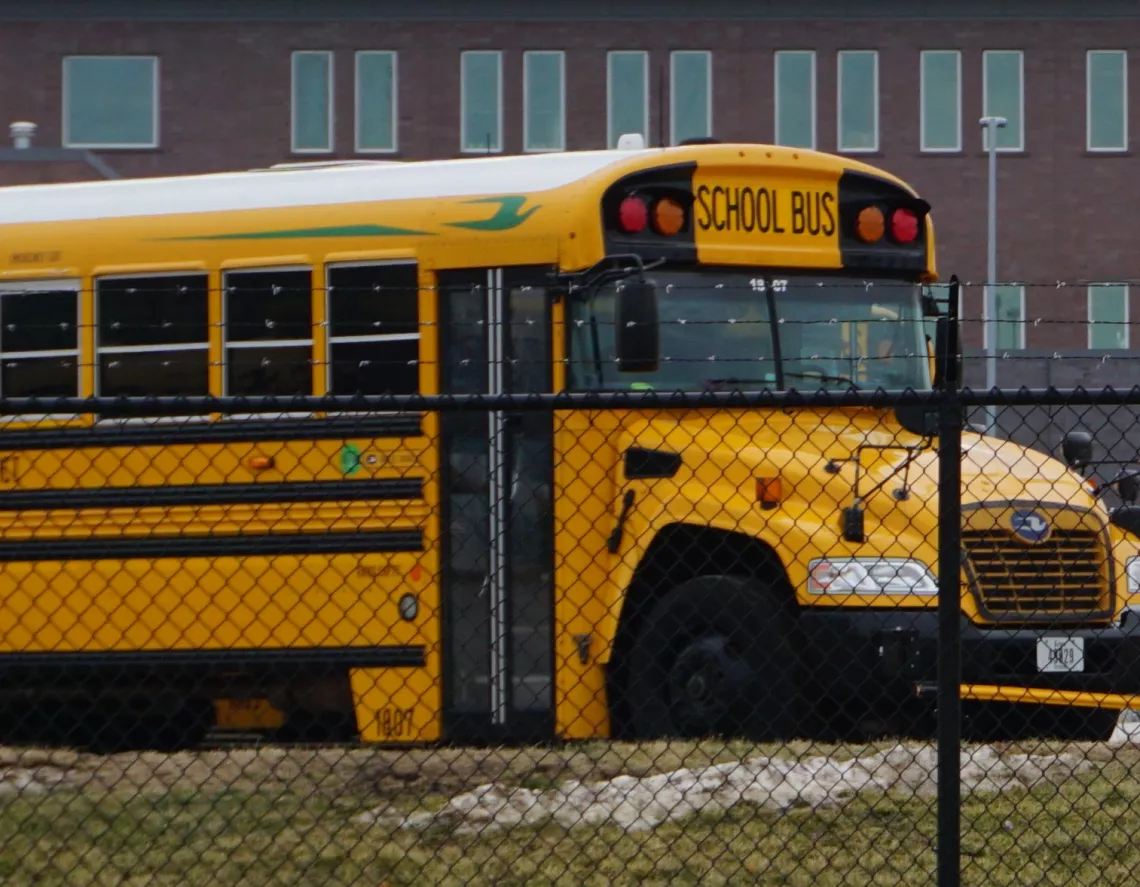
Join us for interesting and informative webinars
Lunch and Learns
Every Friday at noon, we do a Lunch and Learn livestream. See us on Facebook at "Sierra Club Iowa Chapter". These will be recorded so you can watch them anytime. Topics will be selected based on what is happening during the week and will be announced the day before the livestream. During the legislative session, we cover issues coming before the Iowa legislature.
In case you missed our past webinars and lunch and learn sessions, you can still see them.
- Learn about "Victory!! North Dakota Denied Summit's Carbon Pipeline!", August 11, 2023
- Watch "Supreme Beef Update", August 4, 2023
- See "Summit pipeline update", July 21, 2023
Volunteer for the Iowa Chapter
Almost everything we do is done by volunteers like you. If you would like to volunteer for the Iowa Chapter, please let us know by sending an E-mail to Iowa.chapter@sierraclub.org. Or sign up by using the online form. There are many opportunities for you to make a difference:
-
making phone calls
-
developing graphics for banners and flyers
-
working on legislative issues
-
working on elections
-
fundraising
-
organizing events
-
joining an issue committee
If you would like to join our legislative action team, sign up here. Keep on top of what is happening at the Iowa legislature. Be alerted when you should contact your legislators about pending legislation.
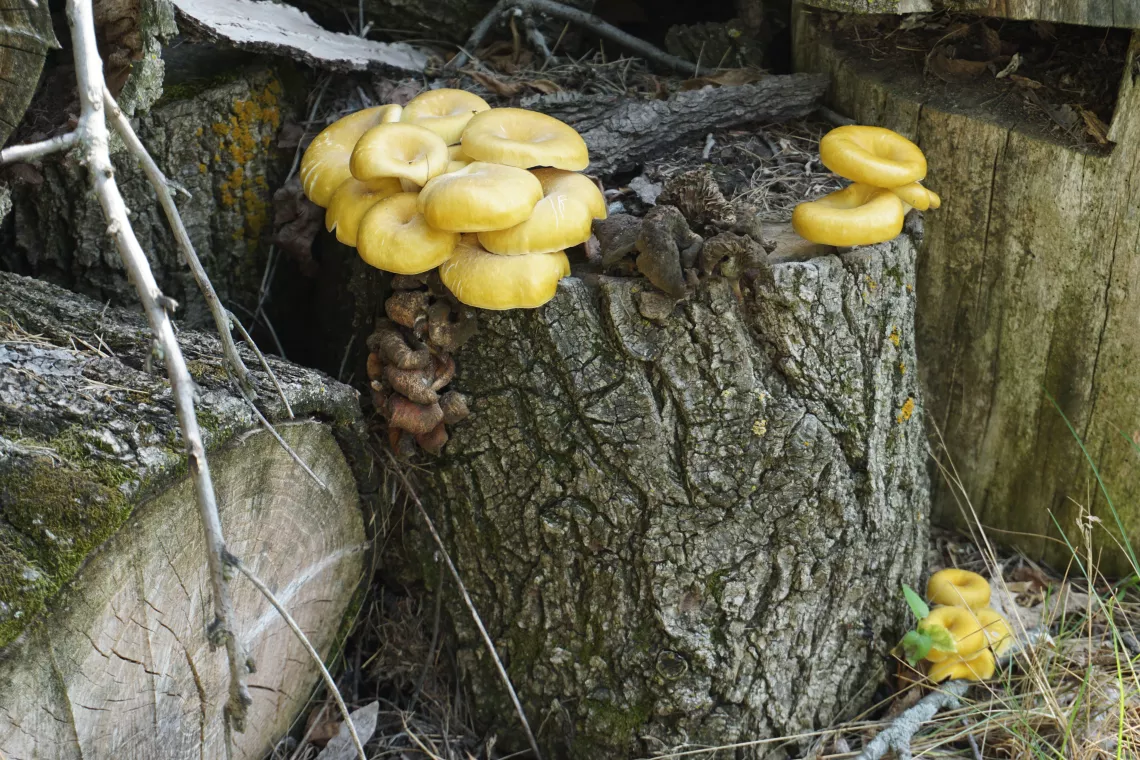
Contribute to the Iowa Chapter
Sierra Club - working every day on Iowa’s environmental problems
Sierra Club is Iowa’s oldest and largest grassroots environmental organization. Not only that, we are the best bet in the state for achieving bold solutions to Iowa’s environmental problems.
We work in the courts, before Iowa’s public agencies, and in the halls of the legislature. The Iowa Chapter's effort to protect the environment takes financial support. The Chapter receives very little financial support from the national Sierra Club. Can we count on you for a donation to ensure even more victories? Your contribution will be put to work here in Iowa on issues that affect every day Iowans – water quality, clean air, protection of Iowa's soil, parks and natural areas, and a strong democracy. The Iowa Chapter is relentless in fighting back bad legislation that affects every one of us.
Your non-deductible contributions make it possible for us to fight bad legislation and to promote good legislation. We appreciate your past and on-going support of these efforts. You can make a non-deductible donation with a credit card. A non-deductible donation supports the Chapter's effective, citizen-based advocacy and lobbying programs. If you prefer, a non-deductible check can be written to the Sierra Club Iowa Chapter and mailed to:
Treasurer
Sierra Club, Iowa Chapter
PO Box 1058
Marion, IA 52302
You can also make a tax-deductible donation with a credit card. Tax-deductible activities are limited to public interest education, research and legal actions. A deductible check can be written to the Sierra Club Foundation with “Iowa Chapter” written in the memo line.
Thank you for your support.
Donate your used vehicle
As the Sierra Club Foundation's Iowa Chapter continues to raise charitable funds to support its work in Iowa, won’t you consider participating in our vehicle donation program? Our partners over at CARS have made the process of donating your unused or unneeded car, truck, motorcycle, boat or RV easy, efficient and secure. They’ll take care of everything from picking up your vehicle to sending you a tax receipt for your generous gift. To learn more about The Sierra Club Foundation's Iowa Chapter vehicle donation program, please call 844-674-3772. Or visit our webpage to get started today!
Sierra Club Foundation promotes climate solutions, conservation, and movement building through a powerful combination of strategic philanthropy and grassroots advocacy. The Foundation is the fiscal sponsor of Sierra Club’s charitable environmental programs.
For more information
Planned giving . . . naming the Sierra Club Iowa Chapter in your will
Ensure your environmental legacy by naming the Iowa Chapter in your will or trust. These gifts cost you nothing now. You can hold onto your assets for as long as you need them.

Thank you for supporting our work!
| When | Earliest: Latest: |
| What |
|
| Word or Phrase | Word or phrase to search for: |
| Leader | All or part of leader name to search for: |
No Matching Activities Found
Loading
| Date | Activity (click title for full description) | Sponsor | Category | Type | Difficulty | Links |
|---|
Loading ...
 Outing
Outing Club support event
Club support event  Social event
Social event  Activist event
Activist event  Multiple events (map only)
Multiple events (map only)